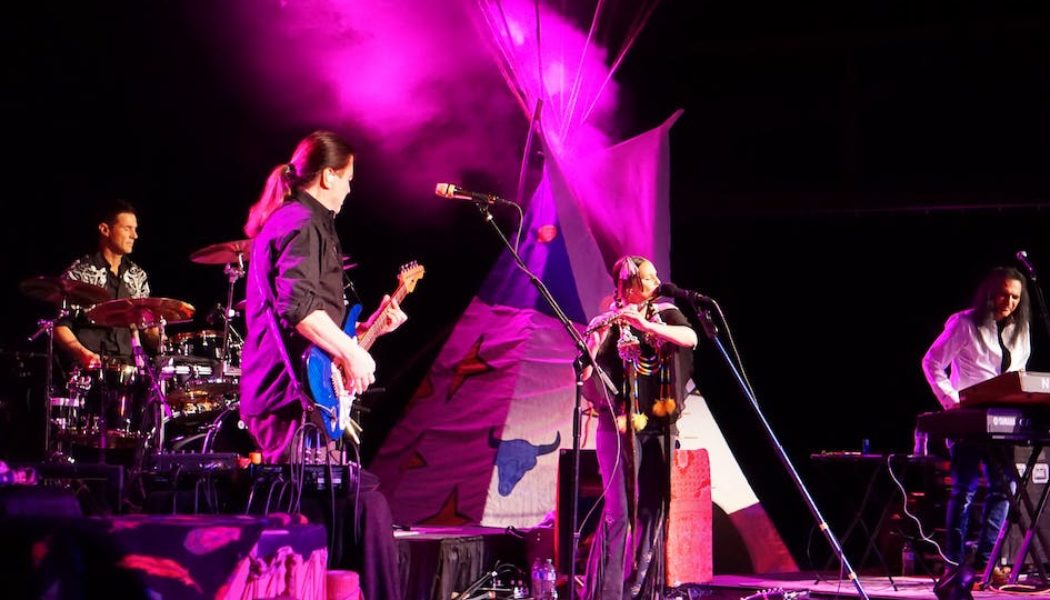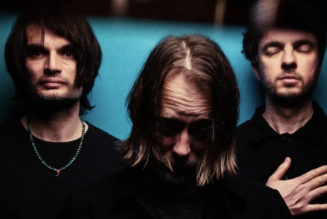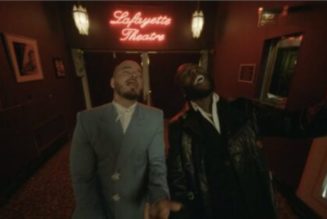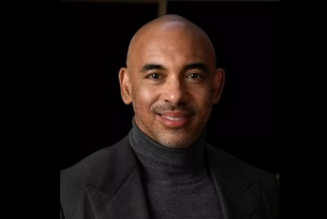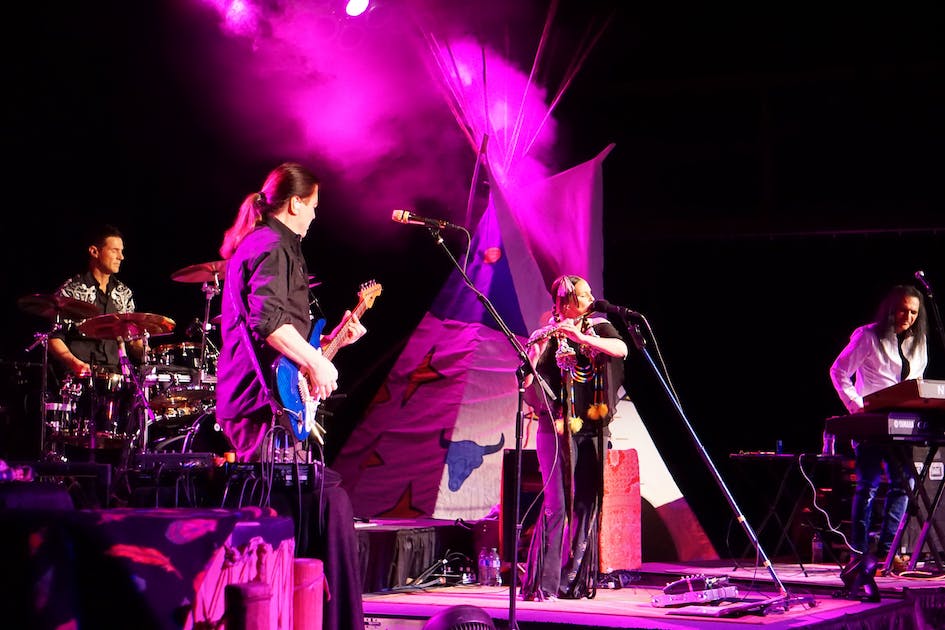
To label Paul Summers LaRoche a musician is only part of his story.
Granted, last year he received the Lifetime Achievement Award at the Native American Music Awards. But that’s just one of the many accomplishments for the founder of Brule, a contemporary Native American rock band with a sound that critics have described as “healing” and a “journey of sight, sound and soul.”
The award was possible only because of a personal journey that prompted LaRoche, at age 38, to begin obeying the Seventh Direction — the spirit within himself. It was an amazing transformation for a man who was raised white and started his career as an architect.
“The floodgate of inspiration opened and I have not been able to control it since,” LaRoche, now 68 and living in Sioux Falls, said of the music that flowed from him after meeting his Lakota family and discovering his biological roots on the Lower Brule Reservation in central South Dakota.
LaRoche has recorded 20 CDs (selling over 1 million), authored the biographical “Hidden Heritage,” done 12 behind-the-scenes concert documentaries aired by PBS, produced a 90-episode TV show focusing on Native American culture and led his “family band” to be the first Native American music ensemble performing with major symphony orchestras.
Their 2007 history-making “Brule, Live at Mount Rushmore: Concert for Reconciliation of the Cultures,” has become the longest-running Native American concert special on national TV.
“We’ve also broken the concert attendance barrier of 10,000 many times, and we’ve toured as far away as Saudi Arabia,” LaRoche said.
And he’s not done yet; LaRoche has composed at least 500 songs or melodies that are unreleased but catalogued, and Brule has a robust calendar of upcoming performances at concert venues, arenas, festivals, casinos and schools.
“I needed to return to my roots to find stability and discover what I was called to do,” said LaRoche.
Growing up white
The southwestern Minnesota town of Worthington was LaRoche’s boyhood home.
Adopted at birth by a caring couple, Clarence and Irma Summers, LaRoche and his younger adoptive brother were fed the largely fictional but loving narrative that they were of French Canadian descent.
LaRoche buried any questions about his biological origins, focusing instead on the positives of his wholesome Catholic upbringing. Charismatic and musically gifted, LaRoche simply strived to fit in, although his darker complexion and unsettled spirit suggested a different truth.
“My musical journey began in 1963 when my dad, Clarence, kind of an old-timer, gave me an accordion,” said LaRoche.
But the typical music outlets youngsters explore didn’t work out. LaRoche liked singing but failed to make his high school choir, and after trying for two years to master the trumpet, the school band director “suggested” he move on.
Coming of age in the early 1970s, LaRoche found his niche playing keyboards and singing in garage rock bands.
He established “Paul’s Place,” a popular Worthington nightclub, sang at weddings and funerals and used training gained in a two-year architectural drafting program at the former Northwest Technical Institute to support his young family.
It wasn’t until after his adoptive parents died in 1987 that LaRoche’s teenage sweetheart-turned-wife, Kathy Summers, dug into documents that eventually led LaRoche to his true origins.
“I just felt there was something significant for him to know about his birth story, and I had to help him find it,” she said.
She believed LaRoche needed a nudge to unlock his full potential. Despite his popularity as a singer and performer in southwest Minnesota and as a singer/keyboardist with promising cover bands in the Twin Cities, his first 20 post-high school years could hardly be termed conventionally successful.
“It was a whirlwind, crazy kind of time,” admitted LaRoche. “I thought I wanted to become an architect, but the world of music always tugged at me very strongly.”
Bouncing between stints with a civil engineering firm and band gigs, coupled with raising son Shane (now 46 and Brule’s lead guitarist) and daughter Nicole (now 44, flutist in Brule), made for an untethered existence for over 15 years.
“Kathy has been the glue that’s kept our family and story going,” said LaRoche, crediting his wife — Brule’s manager — for assuming the bulk of child care duties, holding down an administrative assistant job and managing 50 — yes, 50 — family moves.
“She was probably thinking, ‘Is my husband going to play in dumpy clubs the rest of his life?'” LaRoche laughed.
“I really couldn’t find my place in the regular workforce, as hard as I tried, and I was a struggling musician trying to make my way in a world of cover songs.”
Lakota roots
Summers quietly researched LaRoche’s birth, having found an attorney’s letter among his late parents’ personal papers.
“I sensed an undertone of nervousness, that his adoption was a little under the table, since he was a Native newborn going to [white] parents in their 40s,” she said.
His birth certificate confirmed Pierre, S.D., as his birthplace and named a father, Fred LaRoche, a Frenchman who long ago had entered the Lower Brule tribe.
“His adoptive parents had shared a partial truth,” Summers said. “They just left out the ‘Native American’ part.”
Unbeknownst to LaRoche, Summers started tracking down members of his biological family. One evening, LaRoche picked up the phone and heard a voice say, “Paul, you don’t know me, but I’m your brother.”
LaRoche bonded with Fritz (they had the same mother but different fathers) and came to understand that he’d been given up at birth because of the impoverished and complicated circumstances of his birth mother and the dirt-poor life on the Lower Brule Reservation.
The LaRoches spent Thanksgiving 1993 at the reservation meeting his Native American family. After several more visits, including a naming ceremony and a pow wow, they moved to the reservation for 10 years.
Discovering his Lakota roots, and becoming, along with his children, an enrolled member of the Lower Brule Sioux Tribe, was life-altering for LaRoche, who finally was trusting the spirit within him.
A different sound
“Paul had always played other people’s music or written music for others,” said Summers. “His Native family recognized his gifts and told him, ‘You need to get back into music and write from your heart.'”
LaRoche credits the stories heard, people met, ceremonies attended and the sounds, rhythms and Native lifestyle with unleashing the music that became the soundtrack of Brule.
Daughter Nicole Summers, who played flute in the Greater Twin Cities Youth Symphonies as a teen, has cultivated a flute style that mimics natural sounds: wind, birds and animals.
“I like that we can represent our culture in a good and positive way while being completely original,” she said. “And seeing how young audience members are motivated by us and our performances makes me want to live a better life and be a better role model.”
Over a two-day period in May, LaRoche came full circle when Brule, which is based in Sioux Falls, S.D., performed a series of six concerts for the 3,300 students in the Worthington school district.
Sharing a sense of cultural pride and wellness through the lens of Native people, Brule delivered a message of hope, faith, pride and confidence to a student body that is 74% nonwhite.
“The relevance of the messaging from Paul and Brule — that we’re all part of one community while remaining individually distinct — couldn’t be more important right now,” said Tammy Makram, managing director of Memorial Auditorium Performing Arts Center, site of the school performances.
“Paul and Brule are all about peace and reconciliation.”
Jane Turpin Moore is a Northfield writer.
